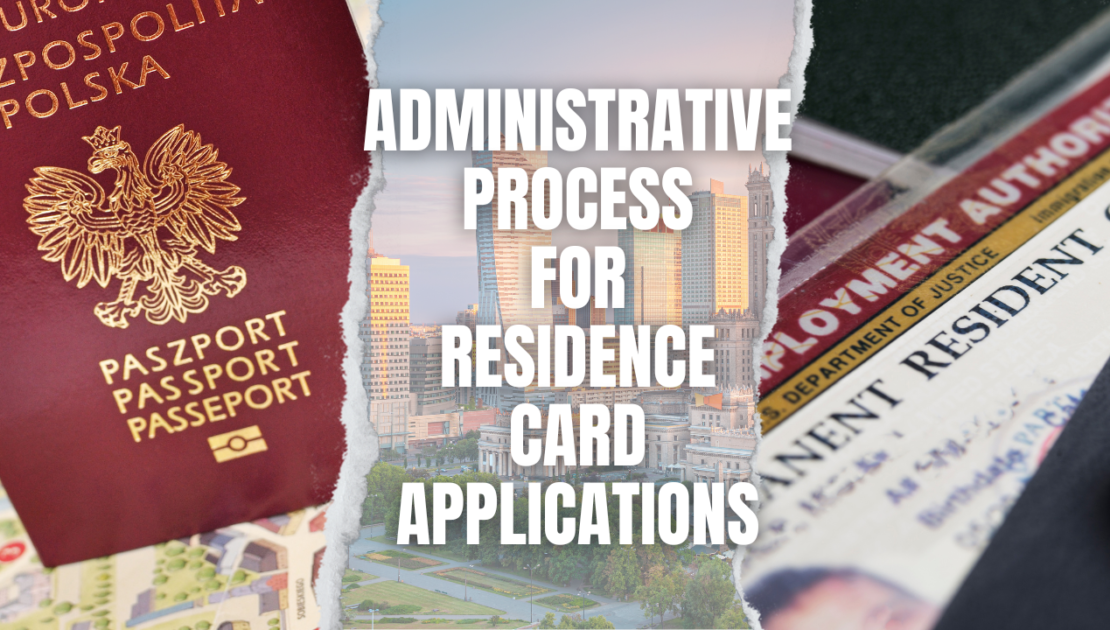- 6 April 2024
- Admin
- No Comments

The Administrative Process for Residence Card Applications
When it comes to obtaining a residence card, navigating the administrative procedures can sometimes be a challenge. Understanding the deadlines and legal instruments available to applicants is crucial for a smooth process. Let’s delve into the details of these procedures and how to effectively address delays or issues that may arise.
Understanding Deadlines
The timeline for processing residence card applications varies depending on the type of permit being sought. For temporary residence permits, including changes to existing permits, the voivode must settle the case within 60 days from specific events such as submitting the application or providing necessary documents.
On the other hand, applications for permanent residence permits or long-term EU resident permits have a longer deadline of 6 months for the voivode to make a decision.
Dealing with Delays
If the processing of applications extends beyond the stipulated deadlines without a decision, applicants have legal avenues available to expedite the process. One such recourse involves issuing a formal reminder in administrative proceedings. This reminder serves to notify the relevant authorities, such as the Voivodeship Office, of the delay and requests prompt action.
Upon receiving the reminder, the Office for Foreigners in Warsaw undertakes a review of the case to ensure timely processing. Should the situation persist despite the reminder, applicants may consider escalating the matter further. This escalation can take the form of filing a complaint with the Provincial Administrative Court after allowing a reasonable period for the authorities to respond following the reminder.
This legal process aims to uphold the rights of applicants and ensure that administrative procedures are conducted in a timely and efficient manner. It provides a mechanism for addressing delays and seeking resolution through appropriate channels within the legal framework governing immigration and residency matters.
Filing a Complaint
Following the issuance of a reminder in administrative proceedings, applicants may opt to file a formal complaint to expedite the decision-making process. While it is typically recommended to wait a few weeks after sending the reminder before filing the complaint, applicants have the option to proceed sooner if necessary. The complaint outlines the specifics of the delay, includes personal and case details, and may also request compensation for the prolonged waiting period, highlighting the impact on the applicant.
Importantly, applicants can choose to file the complaint themselves without the need for legal representation. This empowers individuals to advocate for their rights within the legal framework governing immigration and residency matters. The complaint is directed through the Voivodeship Office to the Provincial Administrative Court for review, where legal experts assess the case and determine appropriate action to address the delays and ensure fair treatment of applicants.
Outcome and Impact
When applicants face significant delays in administrative proceedings, they frequently find relief through legal channels. Courts often intervene, setting deadlines for decisions and sometimes awarding compensation for the extended wait. It’s important to note that taking these legal steps doesn’t harm the residency application process. Instead, it ensures that authorities adhere to timelines and fulfill their duties promptly. This approach not only benefits applicants but also upholds fairness and accountability in administrative procedures.
Conclusion
Effectively navigating administrative procedures for residence card applications involves a comprehensive approach that encompasses understanding deadlines, leveraging legal instruments such as reminders and complaints, and being prepared for potential delays. Applicants must be diligent in adhering to specified timelines, strategically utilizing reminders to prompt timely action from authorities, and being ready to escalate by filing a complaint if necessary. This proactive approach not only demonstrates a strong commitment to the application process but also enhances the chances of securing timely decisions on residency status, ensuring a smoother and more efficient experience overall.










